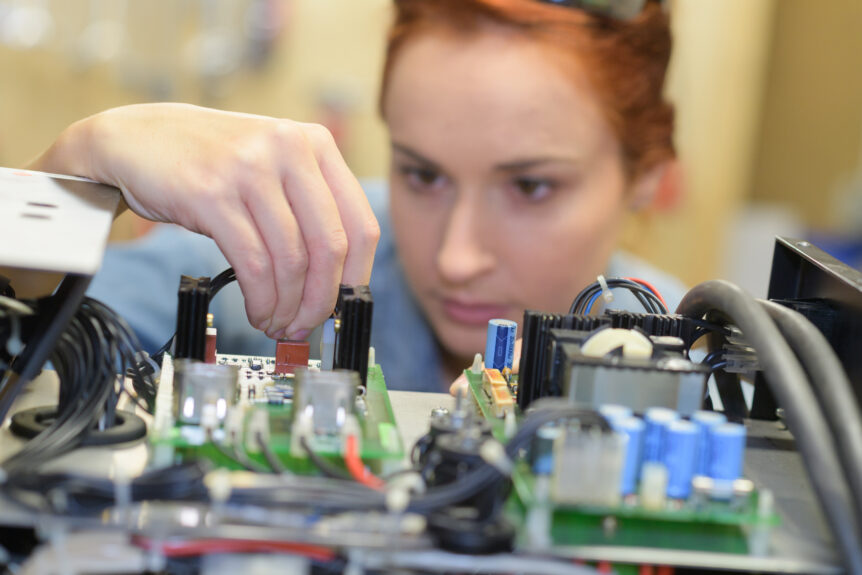When the ANU campus closed down in March, Catherine Galvin’s garage was transformed into the recording site for her engineering laboratories. Task one was a re-write of all her lab manuals, necessitated by the change in environment and subsequent student – and operational – impacts.
“For most of the labs, you go in there, you do the work, you get a mark, and you leave,” she said of the pre-Covid student lab patterns within the Electronic Systems and Design [ENGN2218] course.
“All of a sudden, we had to make these labs, and rewrite all the manuals so the students could take the information off the videos, process it, design circuits, write a report, and submit. I ended up with a lot more marking, a lot more work, but that’s just how it is – it all went very smoothly.”
Outside the labs and into her lectures, Catherine had a new string to her teaching bow. A summer spent creating 87 short videos covering six topics, which she describes as ‘short, sharp, chewable fragments’ would prove to be a huge hit with her students. The video quality was enhanced by the use of a green screen, and her recent participation in a course on presenting to camera. She also drew upon lessons learned from her experience as a previous winner of the Three-Minute-Thesis competition at the University of Canberra.
“One of the reasons students were saying the video lectures were great was because I spent a lot of time writing the scripts. When I won the 3MT competition at UC, I learnt how to be succinct, so it was all about being succinct but clear, getting my message across, having a point – it takes work,” she said.
“I thought, ‘I have got to be really careful here, this could be super dry, because this is electronics.’ So I put in little snippets of humour. Every now and again, I would just put in something fun.”
As Catherine’s classes were humming along, mountains of work were taking place behind the scenes in preparation for the course’s revised end-of-semester exam. The use of invigilated software was ruled out early, after a student survey indicated strong opposition. Instead, Catherine and her team went about creating a Wattle-based exam, with the assumption that students would be readily accessing their textbooks, notes and internet while completing it.
Rather than asking students to describe or define concepts, Catherine’s team created a plethora of different exam questions, prompting the students’ ability to engage in deep thinking and problem solving. All questions were equivalent in their level of difficulty, but no two students would be receiving the exact same set.
“They could have 20 students in the room and do it together, so we couldn’t have exactly the same exam,” she said.
“We had created these questions that were just slightly different – we might have just changed the value of a component, or put in an extra resistor. We did a lot of work on it, we probably came up with eight trillion different exam combinations.”
“I thought the exams [for the course] in previous years had been hard, and I still wanted it to be hard, but I wanted it to be achievable for the best students and for the middle students to also be able to pass.”
The results of the exam, and student satisfaction surveys, would indicate a gratifying semester for Catherine and her students. She is extremely grateful for her team of tutors, as well as her class representative, who was able to keep a continual gauge on the collective feeling among the student cohort.
“When the international students were stranded overseas and the campus got locked down, I kept saying to my tutors, ‘we are going to make this the best course we possibly can and that’s all there is to it. How can we make this one of the best courses these students will ever do?”
“That’s the approach we have taken the whole time.”
Postscript: Catherine’s course, ENGN2218, has just been awarded the 2020 ANU College of Engineering Dean’s 2020 Remote Teaching and Student Experience award.
September 2020
Dr Catherine R. Galvin is a Lecturer in the Research School Electrical, Energy and Materials Engineering in the ANU College of Engineering & Computer Science
Kristie Broadhead is the Team Leader of Promoting Excellence in the Education Communities and Environments (ECE) team – one of the three teams within the ANU Centre for Learning & Teaching (CLT).

